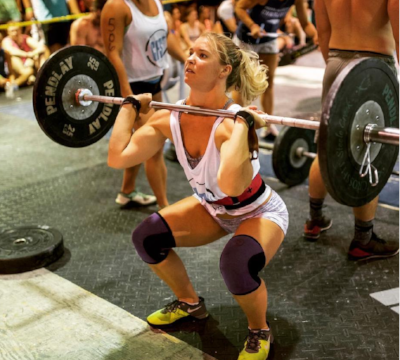Over the past year or two the "functional fitness/crossfit" world has also begun to heavily integrate new sports and new training disciplines into their routine. This is most obvious with the inclusion of swimming into the weekly training regiment. Swimming can be a very unique training stimulus for many people, and something that I think deserves a little more attention from a nutritional point of view. A lot of athletes are now incorporating "recovery swims" into their training but treating them like rest days as it relates to macros, etc. I think this is a huge mistake and something worth discussing. I can't even begin to tell you how many times a client has come to me and said, "Dude, I'm starving on my recovery day" only to find out they swam for a full hour at a "relaxed" pace.
To start off, I asked M2PN athlete and all around bad ass Rikki White, a former elite level swimmer, about her experiences with swimming and nutrition. Not only is her story insightful on the demands of swimming, but I think has a great message about nutrition in high school and college athletics as well.
Introduce yourself and tell me a little bit about your swimming career
My name is Rikki White and I was a competitive swimmer for 15 years, both with year-round club and school teams. I also was an assistant swim coach for 2 years, and a head swim coach for another 3.

Rikki killing it at Clemson
What was your training like?
My training varied throughout my career, but on average, since the age of 12, I swam around 5.5 hours a day, 6 days a week. This time was primarily spent in the water, with a little dry land work spread out a couple days a week. I was a mid-distance swimmer that focused on butterfly, freestyle and IM. It wasn't uncommon for me to have practices where I would swim a mile of just butterfly. I had a couple coaches that believed that some females could not be over trained, so our workouts would be a little longer than the rest of our group's.
What was your nutrition like when you were swimming competitively?
I'll be the first to admit that my nutrition was not so great. I can remember waking up and eating pop tarts for breakfast, buying a sandwich with chips at school for lunch and then usually ate just enough to be allowed up from the table for dinner. After writing all of this down, it's making me a bit sick to my stomach. I think I was definitely motivated to be a great swimmer and to be great at my sport, but at the same time I was definitely motivated by how I looked. I'm not sure at what point that started to take over as my main motivator, but I became so concerned about looking skinny in my bathing suit and having a flat stomach. I started eating less and less, because I started getting this new type of attention. My mom definitely noticed the change in what I was eating and how MUCH I was eating, but she never had a great relationship with food either, so I think it was hard for us to connect and talk about what was happening. Then I started having episodes where I would just pass out, which we eventually learned was from low blood sugar. From that point on, we got the help we needed by talking to my doctors and some nutritionists about what I should be eating, based on my above average level of activity.
Were you given any instructions from coaches on nutrition?
I can remember my coaches always talking about how swimmers can (and should) eat whatever they want, whenever they want. It was always a little blurp after practice saying "eat a little extra tonight." It never seemed all that important though, almost like an afterthought. I do know they would mention it in the parent meetings they held. My mother said that it was always an ask to make sure your kids eat healthy and don't consume too much sugar.
Was there any talk about the importance of sleep?
I don't remember a single coach ever talking about sleep with us. In high school, I took all honors and some AP classes, so I usually had close to 2 hours of homework to do after I got home from practice, ate, and showered. I would go to bed between 11-midnight and then get up the next morning for practice at 5 AM. I also know that the rest of my group had similar schedules. I'm not sure if it's because they thought they couldn't change anything because our first priority was school, but it never seemed to be an issue for our coaches.
Did you place any importance on micronutrients at all?
It was always about volume of food and never about the quality.

Rikki's getting ready to kill it in the Open this year
Why is Swimming Unique?
There are a near endless variety of workouts that one can do with swimming. Short sprints, long endurance work, intermediate intervals, low strenuous recovery work. This aspect is of course not unique to swimming as similar approaches are taken with running, rowing, biking, etc. What is unique is the training environment... being surrounded by water. Of course, lakes and oceans are at the mercy of the weather/time of year/location, but even pools have a large variety in temperatures. Some are quite cool while others are heated. Regardless of the situation, the human body has to work extra hard to try and maintain 98.6°F. For this reason alone, we need to treat training in water differently than other sports as it relates to the impact that it has on our bodies.
TOPICS TO CONSIDER
- Hydration: It’s extremely difficult to provide specific hydration recommendations at a group level, but with aggressive workouts in the pool, especially with warm water, you're losing a significant amount of fluids to sweat. Pay attention to urine color with a goal of "not quite clear" if you catch my drift. On average though, at LEAST 100 ounces per day for someone in the pool for several hours is a good starting point, recognizing that in warmer pools and with longer workouts, significantly more could be necessary. Also, do not forget to include some electrolytes throughout the day to replace what is lost with sweat
- Fueling: Whether you're using activity multipliers, the Harris-Benedict equation or some other method to calculate someone's calories/macros, you need to be careful when accounting for swimming. If one hour of exercise 5 days a week means that you're athlete is eating ~2000 calories a day, we need to increase that if one or more days of training involve swimming. For an hour of swim, I would easily add 200-400 calories to the recommended intake for that day compared to if the session was spent in the gym. You might also ask yourself how much of a "rest/recovery" day this really is. Just because the intensity isn't there doesn't mean that its not a significant stress on the body.
- Don't fear the carbs: Most swimming workouts will rely HEAVILY on the glycolytic pathway to provide energy. For this reason, we want to make sure that our diet includes a significant amount of carbohydrates as a part of the total calorie recommendations. For ~ 1 hour training sessions, maybe 40-45% but if you're doing more like 2-4 hours, then you'd easily want 50-55% of your calories coming from carbohydrates.
- Timing: Just like other training modalities, as soon as the workout is over, we'd want to have protein and carbs almost immediately. For most training sessions, something around 25 grams of protein and 50-100 grams of carbs will help get our bodies OUT of the stress response and into recovery mode. Protein shakes with added carbs can be a perfect option in this situation for quick absorption into the body. As we've talked about before, spiking blood sugar is a GOOD thing for high level athletes post workout. However we would also advise that you have a real meal, about 60-90 minutes after having that shake as well. This meal would be one of the more nutrient dense meals of the day, with lean proteins, veggies and fruits, sweet potato and/or rice and of course some fats as well with avocado, olive oils, etc.
- Sleep: Just like any other high level sport, sleep will be hugely important in your recovery process. Ignoring this will stress the body and cause it to preferentially choose to store your energy intake (AKA food) as fat and not burn it as fuel. Instead the body will choose to break down muscle mass (thanks to elevated production of a hormone called cortisol) to provide energy for your training.
Again, none of these 5 areas are truly unique to swimming, but I do believe that more attention and detail needs to be paid to them than for other training modalities. If you want to get some help with maximizing your performance in the pool, or just in general, hit us up.




